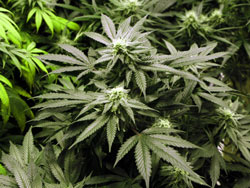The New Jersey Senate was handed a bill last week that would protect the state’s medical marijuana patients from being denied medical care, including organ transplants. Sponsored by state Senators Joseph F. Vitale (D) and Nicholas P. Scutari (D), the bill was approved by New Jersey’s Senate Health, Human Services and Senior Citizens Committee and is now headed to floor vote in the NJ Senate.
The bill, Senate Bill 1220, requires that “any registered, qualifying patient’s authorized use of medical marijuana is to be considered by medical providers equivalent to the use of any other prescribed medication, rather than an illicit substance.” It is designed to ensure that a patient’s use of medical marijuana would not prohibit them from receiving much needed medical care, the bill explains.
Advocates of medical marijuana recognize the treatment as a compassionate and humane way to manage pain and provide relief from side effects that often accompany chronic and terminal conditions.
“The thought that someone would be denied treatment that could help cure their condition or greatly reduce their suffering because of their legal use of this prescribed drug is abhorrent. We must address this issue,” said Scutari in a press release regarding the recent bill.
S1220 would supplement the “Compassionate Use Medical Marijuana Act,” (S119) which legalized medical marijuana for New Jersey residents suffering from chronic and terminal diseases in 2010. The Act explains how modern medical research has found beneficial use for marijuana in treating certain “debilitating conditions” and their symptoms.
The New Jersey’s Department of Health website offers a list of debilitating conditions that can be resistant to conventional medical therapy and are approved by the state’s medicinal marijuana program. Some of the approved conditions include multiple sclerosis, terminal cancer, muscular dystrophy, seizure disorders, and glaucoma.
Patients who have cancer or who are positive for HIV/AIDS are also eligible to treat their conditions and debilitating side effects associated with their treatment and therapy, the NJDOH website explains.
Although federal law currently prohibits the use of marijuana, a total of 18 states and Washington D.C. have enacted laws to legalize the drug for medical use. California was the first state to establish a medical marijuana program, enacted by Proposition 215 in 1996. Some states, such as Colorado and Washington, have legalized marijuana for recreational use.
Despite criticism, many physicians throughout the state have accepted medicinal marijuana as a remedy for a number of conditions.
However, implementation of New Jersey’s medical marijuana law has been a slow and daunting process for many residents and their physicians. On August 9, 2012, more than two years after the act was signed, the Medical Marijuana Program (MMP) registry opened to qualified patients. On December 6, 2012, the first state-approved dispensary, “Greenleaf Compassion Center of Montclair, NJ,” opened for business.
Since that time, New Jersey has approved six medical marijuana facilities, but Greenleaf has been the only one to open its doors, according to an article from politickernj. com. “New Jersey has 562 registered patients eligible to receive medical marijuana, but Greenleaf, which is only open two days a week, has been able to serve about 20 percent of them so far. There’s currently a two-month wait for an appointment,” the article explains.
Dr. Charles Cotton of the Political Science Department said, “Medicinal marijuana has certainly proven to be beneficial for the more than one million American citizens who use it on a daily basis to fight their specific health problems including cancer and AIDS.”
“However,” Cotton said, “Medicinal marijuana will continue to be controversial until the federal government takes a firm stance on the issue, and even then, the controversy will not fully rest.” He explained that until more than two thirds of states pass medicinal marijuana laws, federal law and support on this subject is unlikely.
Chief William McElrath of the University’s Police Department expressed his support for the use of medicinal marijuana in the treatment of individuals suffering from chronic or terminal diseases.
He said, “The University Police have been issued guidelines from the State Attorney General’s Office on how to handle medical marijuana qualifying patients and the State’s medical marijuana program.”
However, McElrath explained, “It is important to remember that only those individuals who have lawfully applied and been issued a State Registry Identification Card are entitled to participate.”
Courtney Woodards, a sophomore political science major said, “Medical marijuana helps patients, it’s that simple. I’ve never heard of any negative side effects, only recent studies showing the benefits of medical marijuana.”
She also believes that medicinal marijuana should eventually be legalized throughout the country. “Yes, it has a high potential for abuse, but what drug doesn’t?” Woodward said.
Dr. Christopher Hirschler of the Department of Health and Physical Education explained how all medications, including cannabis, must be evaluated using a cost/benefit analysis. He explained that we must ask the questions of whether or not the benefits outweigh the side effects or, if safer or more effective alternatives to medicinal marijuana exist.
“While inhaled cannabis has been shown to be effective in reducing chemotherapy induced nausea and vomiting, neither the American nor the European oncology societies recommend cannabinoids as a first treatment choice,” Hirschler said.
Hirschler cited a review published in the journal Critical Reviews in Oncology/Hematology, which concluded, “Medical cannabis remains a paradox in many ways. Cannabis smoke may be carcinogenic but it has been difficult to conclusively link cannabis use and cancer development epidemiologically, and cannabinoids have shown some promise as anti-cancer therapies.”
Senior communication major Aaron Goldner explained how medicinal marijuana is ideal for many patients because it lacks the harmful side effects and addictive properties that painkillers and other prescribed medicines have.
“Medicinal marijuana works wonders for mental disorders such as bipolar disorder and depression, but New Jersey won’t recognize these as serious illnesses,” he said. Goldner expressed, “People are suffering because of the United States losing the war on drugs and their prohibition on a substance less harmful than Advil.”
“The wrong people are in charge of these kind of decisions,” he continued, “They are misinformed and have some sort of false war against pot morale that is based off of propaganda and is created by those who have motives to keep marijuana illegal.”
Jim Shaw, a sophomore biology major said, “Even though many praise California for having very relaxed marijuana policies, I don’t believe that New Jersey should run their medical marijuana program the same way.” Instead, Shaw explained his belief that medicinal marijuana should be put in the hands of pharmaceutical companies rather than in the hands of those who choose to open dispensaries.
“By extracting the THC molecules from marijuana and putting them in pill-like form, people won’t be as encouraged to smoke, promoting a healthier alternative for taking a medication that so many people depend on,” he said.
Dr. Robert Scott of Economics and Finance Department said, “There are many arguments for whether or not medicinal marijuana should be legalized throughout the country.” One of those arguments, Scott explained, is that “by taxing, regulating, and getting marijuana out of corrupted hands, it will be easier to control distribution domestically.”
He explained that the government’s “War on Drugs” has largely been a failure across the board and that by “allowing for medicinal marijuana to be grown on American soil, there is a higher chance that it will be put into the right hands.”
Scott compared New Jersey to states like California, the first state to establish a medicinal marijuana program and a state that is notoriously lenient in their marijuana policies. He explained that if New Jersey ever moves towards a “California-style” of regulating, the state could see more of a financial gain.
“Legalizing medicinal marijuana can lead to taxation which would also open up many different jobs and could stimulate the market,” he said. However, Scott warned, “At this time, medical marijuana is limited in New Jersey because the program is very highly regulated, contained, and is still considered illegal under national law.”
IMAGE TAKEN from salon.com




